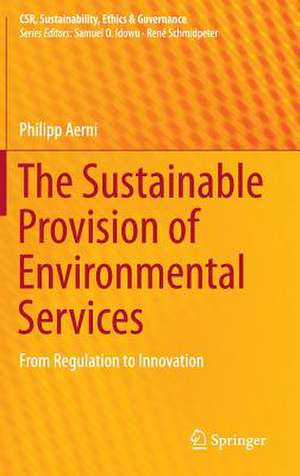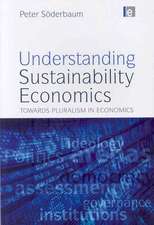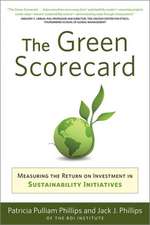The Sustainable Provision of Environmental Services: From Regulation to Innovation: CSR, Sustainability, Ethics & Governance
Autor Philipp Aernien Limba Engleză Hardback – 15 iul 2015
| Toate formatele și edițiile | Preț | Express |
|---|---|---|
| Paperback (1) | 380.63 lei 43-57 zile | |
| Springer International Publishing – 15 oct 2016 | 380.63 lei 43-57 zile | |
| Hardback (1) | 368.39 lei 38-44 zile | |
| Springer International Publishing – 15 iul 2015 | 368.39 lei 38-44 zile |
Din seria CSR, Sustainability, Ethics & Governance
-
 Preț: 400.75 lei
Preț: 400.75 lei - 20%
 Preț: 879.88 lei
Preț: 879.88 lei - 18%
 Preț: 897.65 lei
Preț: 897.65 lei - 18%
 Preț: 1002.13 lei
Preț: 1002.13 lei - 18%
 Preț: 1013.02 lei
Preț: 1013.02 lei - 15%
 Preț: 645.28 lei
Preț: 645.28 lei - 20%
 Preț: 690.12 lei
Preț: 690.12 lei - 15%
 Preț: 646.62 lei
Preț: 646.62 lei - 15%
 Preț: 505.30 lei
Preț: 505.30 lei - 15%
 Preț: 647.40 lei
Preț: 647.40 lei - 24%
 Preț: 700.88 lei
Preț: 700.88 lei -
 Preț: 366.69 lei
Preț: 366.69 lei -
 Preț: 412.06 lei
Preț: 412.06 lei - 19%
 Preț: 549.68 lei
Preț: 549.68 lei - 20%
 Preț: 567.86 lei
Preț: 567.86 lei - 20%
 Preț: 575.49 lei
Preț: 575.49 lei - 24%
 Preț: 750.45 lei
Preț: 750.45 lei - 24%
 Preț: 823.00 lei
Preț: 823.00 lei - 18%
 Preț: 1003.70 lei
Preț: 1003.70 lei - 24%
 Preț: 692.28 lei
Preț: 692.28 lei - 20%
 Preț: 567.86 lei
Preț: 567.86 lei -
 Preț: 377.77 lei
Preț: 377.77 lei - 19%
 Preț: 472.32 lei
Preț: 472.32 lei -
 Preț: 367.40 lei
Preț: 367.40 lei - 20%
 Preț: 576.30 lei
Preț: 576.30 lei - 20%
 Preț: 587.28 lei
Preț: 587.28 lei - 20%
 Preț: 565.08 lei
Preț: 565.08 lei - 20%
 Preț: 565.89 lei
Preț: 565.89 lei - 20%
 Preț: 568.19 lei
Preț: 568.19 lei - 24%
 Preț: 822.45 lei
Preț: 822.45 lei - 20%
 Preț: 558.87 lei
Preț: 558.87 lei - 24%
 Preț: 1160.84 lei
Preț: 1160.84 lei - 24%
 Preț: 792.83 lei
Preț: 792.83 lei - 20%
 Preț: 573.76 lei
Preț: 573.76 lei - 24%
 Preț: 583.99 lei
Preț: 583.99 lei -
 Preț: 375.76 lei
Preț: 375.76 lei - 24%
 Preț: 688.02 lei
Preț: 688.02 lei -
 Preț: 388.13 lei
Preț: 388.13 lei - 24%
 Preț: 744.57 lei
Preț: 744.57 lei - 20%
 Preț: 593.48 lei
Preț: 593.48 lei - 20%
 Preț: 573.76 lei
Preț: 573.76 lei - 19%
 Preț: 437.63 lei
Preț: 437.63 lei -
 Preț: 365.93 lei
Preț: 365.93 lei -
 Preț: 353.51 lei
Preț: 353.51 lei -
 Preț: 366.69 lei
Preț: 366.69 lei
Preț: 368.39 lei
Nou
Puncte Express: 553
Preț estimativ în valută:
70.49€ • 73.80$ • 58.33£
70.49€ • 73.80$ • 58.33£
Carte tipărită la comandă
Livrare economică 02-08 aprilie
Preluare comenzi: 021 569.72.76
Specificații
ISBN-13: 9783319193441
ISBN-10: 3319193449
Pagini: 180
Ilustrații: XXV, 135 p. 21 illus. in color.
Dimensiuni: 155 x 235 x 15 mm
Greutate: 0.41 kg
Ediția:1st ed. 2016
Editura: Springer International Publishing
Colecția Springer
Seria CSR, Sustainability, Ethics & Governance
Locul publicării:Cham, Switzerland
ISBN-10: 3319193449
Pagini: 180
Ilustrații: XXV, 135 p. 21 illus. in color.
Dimensiuni: 155 x 235 x 15 mm
Greutate: 0.41 kg
Ediția:1st ed. 2016
Editura: Springer International Publishing
Colecția Springer
Seria CSR, Sustainability, Ethics & Governance
Locul publicării:Cham, Switzerland
Public țintă
ResearchCuprins
Acknowledgements.- Executive Summary.- 1 The Historical Context of Payments for Environmental Services.- 2 Payments for Environmental Services: Revisiting the Theoretical Baseline Assumptions.- 3 The Practical Perspective of Environmental Services Management.- 4 Conclusions.- Annex.
Notă biografică
Philipp Aerni is Director of the Center for Corporate Responsibility and Sustainability (CCRS) and also Professor for Sustainability and Impact Entrepreneurship at the School of Management Fribourg (HEG-FR). He received his Masters Degree in Geography (with Minors in Environmental Science and Economics) from the University of Zurich and his PhD in Agricultural Economics from ETH Zürich. Prior to his position at CCRS, Dr. Aerni worked as a postdoctoral fellow at the Harvard Kennedy School, the Institute for Environmental Decisions at ETH Zurich, the World Trade Institute at the University of Berne as well as the Food and Agriculture Organisation of the United Nations (FAO). Philipp Aerni is also a senior lecturer at ETH Zurich and the University of Zurich. Among numerous other engagements, he is a member of the Jury of the Swiss Family Business Award, the Forum Genetic Research (SCNAT), and Liberethica (a Platform on ethics, business and religion). As an interdisciplinary social scientist he is interested in the role entrepreneurship and innovation as potential driving forces for inclusive and sustainable change.
Textul de pe ultima copertă
This book addresses the ability of market-based instruments to improve the sustainable provision of environmental services. The author combines field research and insights from the multi-stakeholder dialogue at the FAO to analyze the gap between the predictions provided by theory and the corresponding outcomes in practice. In particular, the author challenges the theory behind Payments for Environmental Services (PES), a concept derived from neoclassical welfare economics, by demonstrating that PES projects often lack financial sustainability unless local entrepreneurs make use of the resulting new networks to create innovative markets for environmental goods. The author calls for a shift of focus from regulation to innovation in projects and policies designed to improve the provision of environmental services. Its spotlight on the positive social impacts of companies that engage in hybrid PES schemes will make the book appealing to practitioners and policymakers alike.
"This book is a refreshing challenge to conventional approaches to payments for environmental services. It offers a more realistic framework that accounts for human creativity and innovation in environmental management."
Professor Calestous Juma, Harvard Kennedy School,Cambridge, MA, USA (Author of the "The New Harvest: Agricultural Innovation in Africa", Oxford University Press 2011)
"Philipp Aerni offers a most useful critical assessment of the theory and practice of payments for ecosystem services. His book helps us understand why such payments sometimes fail to reach their objectives, and what could be done about it, particularly in less developed countries." Professor Thomas Bernauer, ETH Zurich, Switzerland
"This book is a refreshing challenge to conventional approaches to payments for environmental services. It offers a more realistic framework that accounts for human creativity and innovation in environmental management."
Professor Calestous Juma, Harvard Kennedy School,Cambridge, MA, USA (Author of the "The New Harvest: Agricultural Innovation in Africa", Oxford University Press 2011)
"Philipp Aerni offers a most useful critical assessment of the theory and practice of payments for ecosystem services. His book helps us understand why such payments sometimes fail to reach their objectives, and what could be done about it, particularly in less developed countries." Professor Thomas Bernauer, ETH Zurich, Switzerland
Caracteristici
Takes into account the welfare effects generated by the private sector Shows that hybrid PES projects can create markets for environmental goods that are financially sustainable Highlights the positive social impact of companies that become involved in hybrid PES schemes












